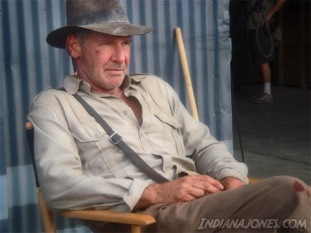THE MOST SACRED RELIC ON THE FACE OF THE EARTH… FILLED WITH INCREDIBLE POWER… AND INDIANA JONES MUST GET HIS HANDS ON IT BEFORE THE EVIL (NAZIS/CULTISTS/NAZIS/RUSSIANS) DO… THE FUTURE OF THE WORLD DEPENDS ON IT!

World-traveling (and world-weary) archeologist Indiana Jones has studied ancient cultures, read sacred texts, raced Nazis for possession of religious artifacts, not to mention whip lessons, and avoiding the wrath of God.
We know he’s action-packed, but is he ethical?
With the release of a fourth Indiana Jones film, I thought it would be interesting to take a look at the character under an ethical microscope.
- Does Indiana Jones teach us anything about ethics?
- Does he always act in an ethical manner?
- Is it important that our heroes be ethical?
We know from “Indiana Jones and The Last Crusade,” that young Indy was a Boy Scout. The Scout Law goes a long way toward understanding Indiana’s own code: “A Scout is Trustworthy. Honesty is part of his code of conduct. People can depend on him… He does things willingly for others without pay or reward…. respects those with ideas and customs other than his own… can face danger…” And, “…has the courage to stand for what he thinks is right even if others laugh at or threaten him.”
In “Temple of Doom,” he is asked by a poor Indian village to retrieve a sacred stone taken by a group of cultists. He not only risks his life and returns the stone but returns the children of the village who were enslaved.
As a Boy Scout in “Last Crusade,” young Indy tries to save the ancient Cross of Coronado from a group of privateers. “This belongs in a museum,” he says as he is forced to handover the relic. Later, an older and persistent Indiana Jones retrieves the Cross and donates it to a museum.
However, from a strict academic background, Indiana Jones leaves a lot to be desired.
According to Associated Press writer David Germain, although Indy “…managed to retrieve the trinket he was after in the opening moments of ‘Raiders of the Lost Ark,’ he wrecked everything else in the ancient temple where the little gold idol had rested for millennia.”
“There are codes of ethics in archaeology,” says Mark Rose, online editor for the Archaeological Institute of America, “and I don’t think he would be a member. Not in good standing, anyway.”
Academic ethics notwithstanding, “We go to the theater to have our values reinforced,” says Jamie O’Boyle, senior analyst with the Center for Cultural Studies & Analysis. The Center is a Philadelphia-based think tank that consults to corporations and institutions on how people find and perceive value.
Dr. Henry “Indiana” Jones, Jr., professor of archeology at a small college in upstate New York fits the classic template of the American Hero, much like western heroes such as the Lone Ranger, Hopalong Cassidy and Roy Rogers.
From his 1999 paper entitled, “Defining the American Hero,” O’Boyle lists ten attributes. American Heroes…
- are ordinary people caught up in extraordinary situations
- answer to a personal code of honor
- are soft-spoken and self-effacing
- seek to avoid confrontation
- have self-doubts
- act only when provoked far beyond all reason
- do not act for personal gain or glory
- act only for the good of the community
- forgive their enemies if they show repentance
- want nothing more than to return to normal life
With the recent ethics scandals about individuals acting for personal glory and/or profit, some would argue that we are living in a time without heroes. In fact, O’Boyle points out that Americans “…don’t bemoan the loss of something we don’t believe exists… Organizations such as the Carnegie Hero Fund exist to seek out and reward individual heroism… Newspapers across the country regularly run… ‘Local Hero’ columns.”
“An American hero lives by a personal code of honor,” O’Boyle tells us. But this “…personal code has to be shared by the audience in order to be recognized as valid. It is theaudience’s code,” O’Boyle points out. “The hero is a stand-in for the audience in a world that has strayed from the code.”
What the fictional Indiana Jones lacks in scientific, ethical protocol he makes up for in the larger principles of duty, honor, loyalty, courage as well as compassion for others in need. Ultimately, that is what he teaches us. It’s a lesson his father, Jones, Sr. instilled in him.
“The quest for the Grail is not archeology,” Senior tells his son. “It’s a race against evil.”
Whenever the suggestion of his own glory or compensation is brought into the picture, Indy clearly sets the record straight without any pretense.
Dr. Schneider: “We both wanted the Grail. I would have done anything to get it. You would have done the same.”
Indiana Jones: I’m sorry you think so.
“In other words,” O’Boyle says, “acting ethically is an integral part of being a hero. Without it, you are simply an action figure.”
In the end, all Jones wants is to return to the classroom (normal life) and spend the rest of his time teaching and exploring history. “The message was plain,” O’Boyle tells us. “Live up to your internal code and it will guide you through the tough spots to take you home.”
Perhaps what Indiana Jones does – what all heroes do – is remind us to strive to become a little more heroic in our own lives.
Comments









